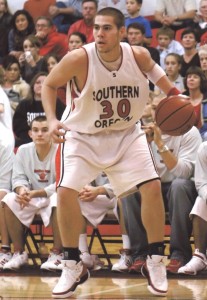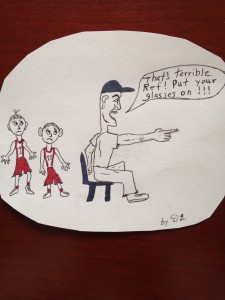 How important are academics for an athlete? Growing up as a young kid I always wanted to play college football or basketball – some day possibly in the NFL or NBA. Never once through grade school did I learn that in order to play high school or college sports you had to have passing grades. The only reason I passed my grades was because I was competing with my fellow students.
“What are you going to major in when you get to college?” I asked one of my friends. “Oh, football – maybe basketball,” he responded. Some kids really have no clue that grades are so important. I went on to explain to my friend. “Football is not a major. I’m speaking of majoring in physical education or science?”
How important are academics for an athlete? Growing up as a young kid I always wanted to play college football or basketball – some day possibly in the NFL or NBA. Never once through grade school did I learn that in order to play high school or college sports you had to have passing grades. The only reason I passed my grades was because I was competing with my fellow students.
“What are you going to major in when you get to college?” I asked one of my friends. “Oh, football – maybe basketball,” he responded. Some kids really have no clue that grades are so important. I went on to explain to my friend. “Football is not a major. I’m speaking of majoring in physical education or science?”
A very small percentage of athletes make it to the NFL or NBA. Pick a field that you enjoy so when you graduate you can land a decent job. Even if you’re a great athlete, injuries could end your career, and then what?
I’m not going to get into the GPA (Grade Point Average) aspect of it, because I’m sure it varies in some schools. But basically if you can maintain a C average (2.0 GPA) you most likely will be allowed to play sports at most schools. There are exceptions with schools that have stricter requirements than others. If an athlete receives an athletic scholarship from a college, it’s important that he or she reads the agreement. Grades come into the picture – you have to maintain a certain GPA. If the athlete does not comply with the agreement, he or she will be declared ineligible and cannot play until the grades are valid again. Pay attention … some colleges will require that the tuition money be paid back. Before signing to play college sports, read any kind of agreements you sign very carefully.
I started looking into the importance of grades and sports when Coach Durham, my eighth-grade coach, informed our basketball team about the matter. I realized I had to put in a great effort to keep my grades up.
If you know an athlete that has no clue about how important grades are, let them know. Coaches at most high schools have programs set up for students that struggle academically. My heart goes out to athletes that have amazing talent but can’t make the grades – someone could have helped them.
One last note, some students have parents that are not educated. They don’t know themselves what goes on at school – some don’t even know how to read. But if people help, they can make a difference in one kid’s life. To the people that have helped kids with grades and explained to them the importance, take a bow you’ve made a difference.

 My passion is writing about success stories – mostly sports. There are so many amazing stories here in the great northwest. I will soon be releasing my third book. It’s being published as we speak – I’ll keep you posted on that so stay tuned.
My passion is writing about success stories – mostly sports. There are so many amazing stories here in the great northwest. I will soon be releasing my third book. It’s being published as we speak – I’ll keep you posted on that so stay tuned.